
A roundup of the movies we caught at this year's Telluride Film Festival.
Words by John Bennett
When you arrive at the Telluride Film Festival, you almost feel as though you’ve stumbled into some cinephile fairy tale. In the first place, it’s a bit of an odyssey to get there. My group, affiliated with the University of Wisconsin, took a flight from Madison to Denver, a second flight from Denver to Durango, and from there drove two hours through sparsely populated mountain towns in order to reach the Colorado hamlet. Next, the locale is breathtaking. With a light chill of the encroaching fall in the air, large, verdant mountains flank the city on virtually all sides. At any given point in the day (barring rain), at least one mountain face is bathed in heart-softening sunlight. If this weren’t enough, stars walk among the plebeians at the fest with little ceremony or entourage, making it a great joy to spot faces in the crowd who are anything but. But, of course, the most substantial joys of the festival are the films themselves. At the 2018 Telluride Film Festival, I had the pleasure of checking out 13 new features, some of which have already played at other high-profile fests, others of which will enjoy end-of-year awards consideration. The films discussed here will be presented in the order in which I viewed them.

The festival stumbled out of the gate with Fistful of Dirt (**). The film, directed by Sebastián Silva, has the honour of being one of the first films shot in Puerto Rico after Hurricane Maria devastated the island around a year ago. Displaced by the storm, the young Yei (played very well by newcomer Julio Gastón Ramos) lives with his dying mother in the home of another Puerto Rican family. Struggling with both his mother’s illness and the open hostility of his host family, Yei seems to find comfort in tracking and befriending a mysterious sea creature he happens upon one day. However, this bourgeoning friendship is threatened when the unscrupulous Alicio (Modesto Lacen) smells a profit in the capturing and showcasing of the strange creature. If you are looking for fare that deals with the natural disaster and its consequences in any concrete way, you’ll have to keep waiting. Though the film touches on the experience of being a refugee in one’s own home, Fistful of Dirt’s fanciful story gives little insight into post-Maria Puerto Rico. Social awareness is not, of course, the sole prerequisite for a successful movie, but even as a magical realist narrative, Fistful of Dirt doesn’t quite hang together. The villains are one-note, the scenes with the ailing mother are maudlin, and some story developments make little sense (why does Alicio try to kill the creature more than once if he wants to show it off for financial gain?). On a technical level, A Fistful of Dirt looks and sounds perfectly fine, but the film is ultimately tasteless in two senses of the word: its story is bland and plodding and its social awareness is, at best, myopic.

Things picked up soon thereafter with Hirokazu Koreeda’s Shoplifters (****). With Shoplifters, which won the Palme d’Or at Cannes, Koreeda puts yet another variation on his go-to family drama template. Few works manage to be so simultaneously touching and lightly unsettling as Koreeda’s new work, which tells the story of a ragtag group of individuals who pool their meagre resources in order to live more-or-less happily as a family. In order to survive, the family members persistently and adroitly commit acts of petty theft. Koreeda crafts his story in such a way that illicits a complex blend of emotions. At the outset of the film, the family takes in Yuki, a young girl who runs away from her abusive father and neglectful mother regularly. This act of charity, along with the family’s humming symbiosis, makes us care for them deeply. As the story progresses, however, we understand more and more how unhealthy and unstable their lives are, and how the initial kindness we witnessed was something of a trompe l’oeil. All this is executed in Koreeda’s unassuming, steady style, which features a few images whose composition brilliantly communicate dramatic story developments (watch for the rolling oranges that ring in the film’s final act). Shoplifters is a bit overlong, mostly because it juggles so many characters. What’s more, one character who works as an erotic hostess (in a setup reminiscent of Wim Wenders’ Paris, Texas) has a relationship with a client that greatly stretches credulity. But these are minor complaints; Shoplifters is ultimately a film that innovatively plays like a true crime film by way of Yasujiro Ozu.

My personal favorite of the festival was Cold War, (*****) Pawel Pawlikowski’s follow-up to his Oscar-winning film Ida (2014). Cold War follows the sweeping romance between Wiktor (Tomasz Kot) and Zula (Joanna Kulig), a singer in the travelling folk orchestra for which Wiktor is the conductor. Using an elliptical and economic storytelling style that checks back in with the lovers every few years between 1949 and 1964 - from the bucolic fields and Stalin-ised concert halls of Poland to the jazzy, smoky, cavernous night clubs of Paris. With Cold War, Pawlikowski seems to return to many of the ideas put forth by Ida. Given that both films render beautifully composed images in luminous black and white within a square aspect ratio, one could even imagine that they take place in the same universe of Pawlikowski’s unique vision of Europe - one hardened, embittered, and addled by the atrocities of World War II and resentful of the encroaching threat of Soviet authoritarianism. At Telluride, the film was programmed along with Sergei Parajanov’s 1967 short Hakob Hovnatayan - a purely avant-garde work by the creator of the haunting The Color of Pomegranates. The short didn’t enjoy the warmest of receptions at the festival (despite its artistic strength), but it succeeded in teasing out the Slavic folk qualities of the images that open and close Cold War, images that invoke the tradition that binds Zula and Wiktor on their mad boozy romance across Europe and through some of the headiest years of the twentieth century.

The following morning brought the minor revelation that is Alfonso Cuarón’s new film, Roma (****½). Five years after releasing Gravity, Cuaròn brings to the screen the story of Cleo (Yalitza Aparicio, a non-professional as tender and brilliant as Lamberto Maggiorani of Bicycle Thieves), a maid and nanny for a bourgeois family in '70s Mexico City. Roma, Cuaròn’s first Mexican film since Y Tu Mamá También, is both epic and intimate, both naturalistic and stylised. To illustrate these contradictions that are so central to the success of Roma, let’s take one shot found roughly a third of the way through the film. In a palatial movie house, Cleo informs her boyfriend Fermín (Jorge Antonio Guerrero) that she is pregnant. He reacts tepidly, then makes an excuse to momentarily leave the theatre. As the uninterrupted shot continues, we realise along with Cleo that he is not coming back. The wide shot captures much of the architectural glory of the movie palace, letting us take in the war comedy playing on the theatre’s screen along with the theatre’s many spectators. Yet the dramatic thrust of the shot centres on Cleo’s small, heartbreaking reaction to Fermín’s lie and absence. The shot’s stunning deep composition does not distract us from the narrative, but instead underscores Cleo’s quiet fragility during the episode. And an episode is exactly what the moment is: Roma moves in picaresque fashion from moment to moment, each filmed in a beautiful roving style that serves the naturalistic material instead of functioning on a separate parallel track. In two or three instances during Roma’s 135-minute running time, a stray image may be overripe (a man in a costume all but addresses the audience with a mournful song during a forest fire in one of the film’s few missteps), but these images occur so infrequently that they shouldn’t detract from the film’s general aesthetic wholeness.

On the heels of Roma came Matteo Garrone’s Dogman (****). In this Italian crime film, Garrone instills a similar sense of dread and urban rot as he did in 2008’s Gomorrah. Though Dogman is not quite as grand or complex as Gomorrah, it’s nevertheless a fascinating treatise on companionship, power, and the slippery line that separates the two. The film follows Marcello (Marcello Fonte, giving a very strong performance), a man as scrappy and likeable as the many neighbourhood dogs he grooms and looks after for a livelihood. After giving us a sense of how well liked Marcello is within his crime-filled community, and how doting a father he is towards his young daughter, Garrone ups Dogman’s stakes by settling into the main story of Marcello’s tragic friendship with Simone (Eduardo Pesce, to whom playing menacing and brutish seems to come as naturally as breathing). Simone, a coke addict, has violently persuasive power over Marcello, forcing the beloved neighbourhood business owner to agree to collaborate on all kinds of thieving violent schemes. It gets to the point that even when Marcello firmly declines, Simone thuggishly refuses to take no for an answer. The film leaves audiences wondering what Marcello’s breaking point will be, or if the film’s Cabiria-esque protagonist has a breaking point at all. Garrone’s film is tragic in the Greek sense; Marcello has few options in dealing with his abusive friend, giving Dogman an effective air of both dread and sadness. The sadness the film conjures is made all the more poignant by Marcello’s wide-eyed likeability. Two key moments, each bathed in the film’s general hazy yellowish look, get to the heart of Dogman. In the first, Marcello manages to save a dog nearly killed by Simone during a crime spree. The second crucial moment is the film’s hauntingly sad, maddeningly ambiguous finale. With such moments, Garrone makes mysterious yet powerful statements on redemption or lack thereof. Dogman may not be an easy watch, and it may not be Garrone’s best work, but it’s nevertheless a vital, fascinating cinematic experience.

Crime paid as poorly in southern Italy as it does in the southern California setting of Destroyer (***), an interesting, if uneven, hardboiled thriller from director Karyn Kusama. Los Angeles detective Erin Bell (Nicole Kidman) looks like she’s seen better days as she staggers to a crime scene that’s already being handled by some of her colleagues. Jumping back and forth in time, Destroyer tells the story of Bell’s connection to the crime, slowly giving us clues to a traumatic event that occurred early in her career. Though Destroyer is perfectly engaging as a mystery/thriller, the film has a few noticeable bugs. The film’s temporal jumps are a little overwrought, and they ultimately get in the way of our understanding of narrative events and character relationships. What’s more, there’s something about Kidman’s character that doesn’t play quite right. Maybe the wig could have been more credible, maybe the makeup could have been less mask-like, maybe her delivery style could have been less hushed and grunting - but in the end, her performance doesn’t quite coagulate into something organic. Still, the risk of her transformation is admirable, even if the final product leaves something to be desired. And despite these problems, Destroyer does play with the tension between nihilistic violence and deeply-felt pathos in a genuinely moving way.
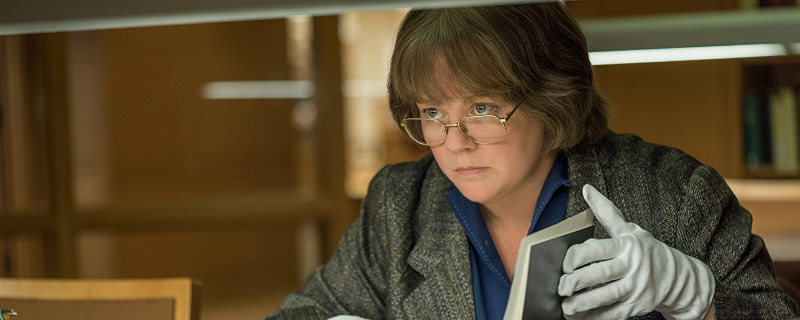
After the back-to-back brutality of Dogman and Destroyer, it was an immense relief to watch the literary-themed confection that was Can You Ever Forgive Me? (***½) The film tells the true story of Lee Israel (Melissa McCarthy, truly proving herself as an actress), a down-on-her-luck biographer of early twentieth century vaudevillians and wordsmiths like Fanny Brice and Noel Carroll. Demand for a new book project is low and her agent (Jane Curtin) isn’t returning her calls. As the bills add up, Lee begins forging collectible letters, writing in the voices of all the figures to which she had dedicated her non-criminal professional life. Abetting her is the equally broke writer Jack Hock (Richard E. Grant). The pairing of McCarthy with Grant was truly inspired. Both actors are immense assets to whichever comedy they may be in; both can give bravura comic performances (see Bridesmaids, Withnail & I) that manage not to distract from the world of the film. Both are in top form here, ensuring that our experience of Can You Ever Forgive Me? is uproarious during the best moments and consistently pleasant between those moments. Still, for as fun and funny as it is, you can’t help but wish that Can You Ever Forgive Me? was just a bit better. The film’s pacing is somewhat halting, with inelegant transitions from scene to scene. Within the scenes, certain lines of dialogue feel stilted (despite the extraordinary comic ability of the two leads). The film should be commended for the relaxed attitude with which it treats its main characters’ homosexuality, but their parallel meet-cute near-romances feel a little tacked on. Nevertheless, even if the film isn’t quite the soaring comedy it could have been, Can You Ever Forgive Me? is definitely a fun watch, especially if you dig the cultural milieu the film revels in.
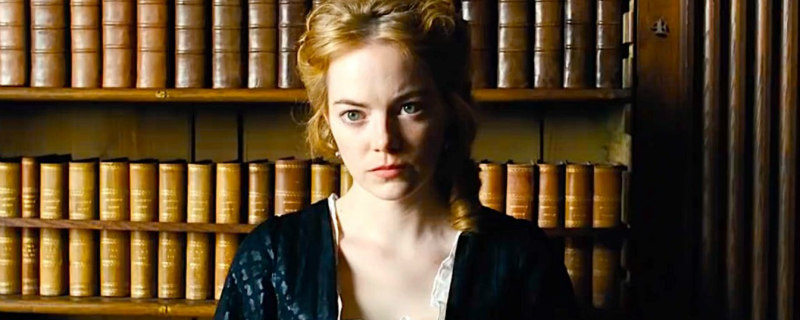
After the unrelenting sangfroid comedy-horror (mostly horror) of The Lobster (2015) and The Killing of a Sacred Deer (2017), Yorgos Lanthimos is back with his most palatable fare yet: The Favourite (****½). For the schlock lovers out there who are worried that an 18th century courtly period piece is too vanilla for the Greek provocateur, rest assured that The Favourite has plenty of Lanthimos’ trademark acrimony, stylisation, and bizarrerie to go around. Queen Anne (Olivia Colman, giving the performance of the festival) is the ineffectual and easily manipulated monarch of an England at war with France. Her closest confidant is Lady Sarah Churchill (Rachel Weisz), the wife of a military commander who, when not sharing a giggle with the queen or helping to treat the queen’s gout, whispers pro-military policy into the monarch’s ear to advance her political agenda. When the fallen Lady Abigail (Emma Stone), a relation of Lady Sarah’s, arrives at the palace to work as a maid, Lady Sarah takes a shine to her and promotes her to work as her own personal servant. This, however, puts Lady Abigail in more direct contact with the queen, thus setting into motion the chess game of who can curry the queen’s favor more effectively. The Favourite is no Downtown Abbey (but take your great aunt to see it anyway and play dumb afterwards); it has the period-perfect, cruel-but-sexy edge of de Laclos’ Les liasons dangereuses or Voltaire’s Candide. Lanthimos’ persistent fish-eye and low-angle shots brilliantly capture a smarmy yet stately court life of individuals who are either too clueless to know what’s going on or conniving enough to recognise and exploit that cluelessness.

The English festival-circuit perennial Mike Leigh was represented at Telluride with Peterloo (****), a sober film about the incubation of a pro-labour movement and subsequent massacre of protesting labourers at the hands of the British government in early 19th century Manchester. Peterloo isn’t quite as rich or engaging as Leigh’s last two films, Another Year (2010) and Mr. Turner (2014), but the film also has a substantially different agenda from those films. Where those works sought to draw the viewer into the emotional lives of the main characters, Peterloo presents an array of characters from a greater distance. A renowned orator treats similarly minded speakers with condescension. A woman angrily voices her confusion regarding a speech. At first, the parade of scenes depicting orators speaking passionately to unite workers seems repetitive, but these scenes are ultimately used strategically: as we witness speech after speech in different settings, we take on - to a certain degree - the perspective of the listeners. We understand how, through repeated exposure to ideas, the workers of Manchester came to understand economic systems and their worth therein. These moments of dignified education make the film’s climactic massacre all the more tragic. The massacre itself is harrowingly effective. Leigh stages it without the nudging of a lachrymose string soundtrack or soupy dramatic irony. It unfolds very naturally, making its horror all the more confrontational and senseless. Peterloo isn’t an easy watch, or even an especially entertaining watch, but it is artfully executed and worthy of your time.
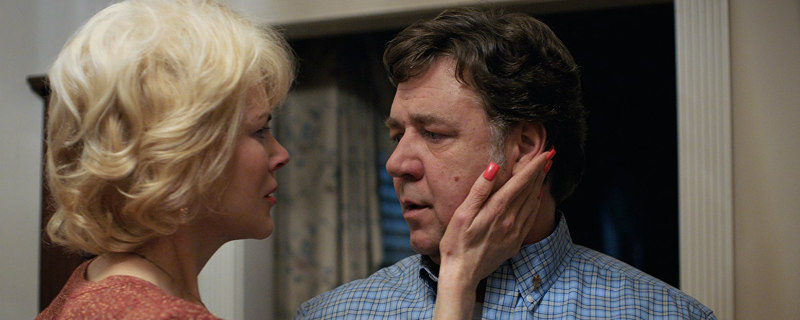
One of the films that audiences at Telluride fawned over the most was Joel Edgerton’s second directorial feature, Boy Erased (***). The film, based on the memoir by Garrard Conley, depicts the abusive and absurd “treatment” that LGBTQ youths from evangelical families experience during conversion therapy. As Jared (the names of the memoir were altered), Lucas Hedges plays a young college student who, after a traumatic encounter, confesses to his parents that he may be gay. The parents (Nicole Kidman and Russell Crowe, both giving excellent performances) consult their community religious leaders before swiftly placing Jared in a prison-like conversion therapy program run by the sinister Victor Sykes (Joel Edgerton). Boy Erased suffers from a similar narrative problem as Destroyer; the story jumps around in time too frequently. In Destroyer, at least, such jumps generated suspense regarding an event revealed during the climax. The jumps in Boy Erased are far less motivated. The result is a hodge-podge of dramatic moments that inhibit our understanding of and our emotional reaction to the film’s message. Another effect of this scrambled storytelling is that important threads seem to be abandoned altogether. The film cues us to think that one of Jared’s companions at the prison-like conversion therapy (played by Xavier Dolan) will occupy a more important place in the story than he does. The same goes for the individuals with whom Jared has gay encounters (the first traumatic, the second tender). Something about these strains feels a little dashed off, possibly because the film is too impatient to let any specific event unfurl and decant a little. Yet to its credit, Boy Erased manages to be relatively engaging despite the large hurdles it creates for itself. Edgerton’s visual style is even, and the film manages to pack some piercing emotional punches, especially in scenes between Kidman and Hedges.
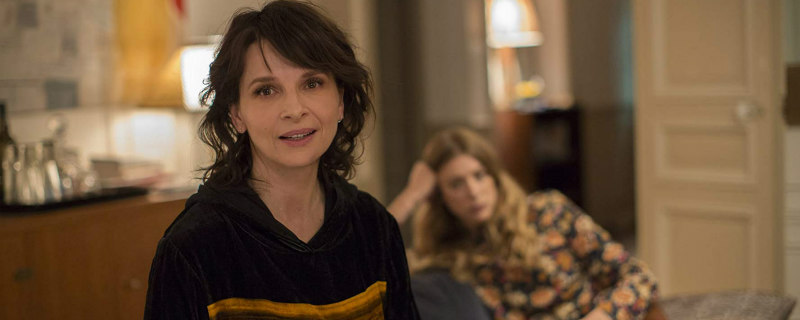
If you are in the market for a thoroughly Gallic (i.e. talky and sex-filled) cinematic experience, then you may want to seek out Olivier Assayas’ Non-Fiction (****). Echoing the films of Eric Rohmer (the king of the conversation movie), Assayas tells the light-on-its-feet story of a struggling author (Vincent Macaigny), his political operative wife (Nora Hamzawi), his publisher (Guillaume Canet), and the publisher’s actress wife (Juliette Binoche). The four principle characters engage in conversation after conversation about culture as well as some discreet philandering. Just as Rohmer did with the male characters of his six Moral Tales, Assayas never takes anything his characters say or do too seriously. At first, the film leans a little too heavily on discussions surrounding eBooks and the competition they create for traditional publishing. It feels as though Assayas is straining to make his film relevant regarding a debate that itself is already 10 years old (similar problems plagued the otherwise brilliant Clouds of Sils Maria). But Non-Fiction happily goes on to reveal itself to be not a film about the publishing industry, but rather a collection of character studies that maintains an air of amusingly mocking tenderness towards its chatty subjects.
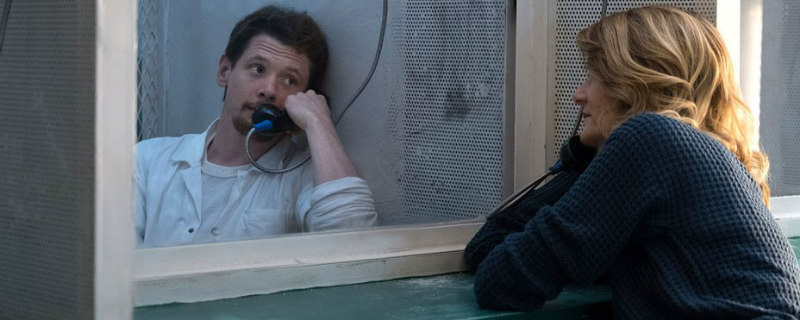
I was having “based on a true story” fatigue by the time I saw Trial by Fire (**½) a competent yet flavourless drama from director Edward Zwick. The film recounts the true story of Cameron Todd Willingham (Jack O’Connell), a man who was executed by the state of Texas for killing his three small children in a fire. Thanks to the efforts of volunteer Elizabeth Gilbert (Laura Dern), evidence that Todd had not been given a fair trial begins to come to light. Though it’s about a worthy subject, Trial by Fire’s moroseness is made all the more depressing by its plodding, rote pacing and stylistic execution. The film’s first act, which (yet again) jarringly jumps back in forth in time is a little disorienting and occupies a disproportionate chunk of the film.

By the time the plot of Lukas Dhont’s Girl (***½) has begun, Lara, a young teenage girl, has already progressed substantially in the process of transitioning from male to female - her hormone treatment progresses apace and her family is aware and supportive of her identity. Impatient to complete her transition, Lara struggles to bide her time taking care of her brother, going to school, and practicing a grueling ballet regiment. I must confess, it’s hard for me to evaluate Girl objectively. I would need to hear from more trans audiences and critics to have a clearer sense of whether the film gets things right. I feel fairly certain that moments like the one in which a teacher forces girls to vote on whether they’re comfortable sharing a dressing room with Lara or the one in which Lara’s peers demand to see her genitalia at a party accurately depict the small stabs of indignity that trans people face on a daily basis. But the film’s ending is deeply upsetting, and it’s hard to say to what effect. On one hand, this ending could accurately depict a sense of frustration experienced by many in the trans community. On the other, it could also be read as an outré coda that not only misrepresents the trans experience, but also sends a questionable message in terms of how to transition safely. I’ll defer to others with more knowledge and experience on whether Girl gets it right or not. Until then, I will put forth that’s it’s a fascinating film that could benefit from a little more narrative shape and a less grisly finale.
